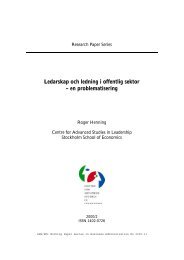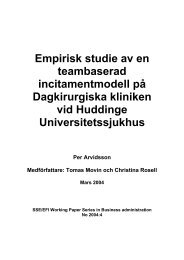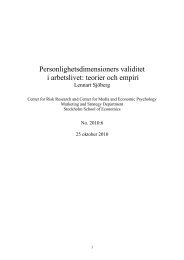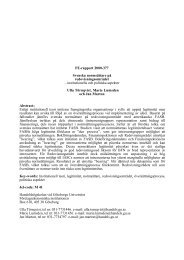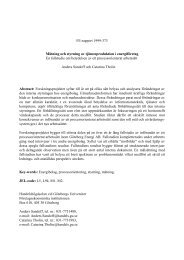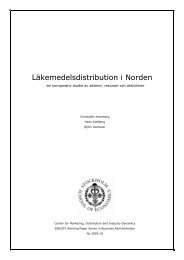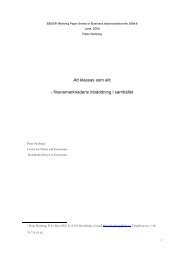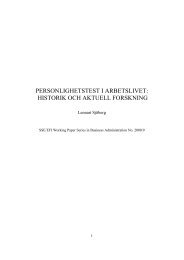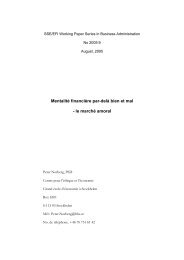Big Five Plus - S-WoBA - Handelshögskolan i Stockholm
Big Five Plus - S-WoBA - Handelshögskolan i Stockholm
Big Five Plus - S-WoBA - Handelshögskolan i Stockholm
You also want an ePaper? Increase the reach of your titles
YUMPU automatically turns print PDFs into web optimized ePapers that Google loves.
229. Saboonchi, F. (2000). Perfectionism. Conceptual, emotional, psychopathological, and<br />
health-related implications. <strong>Stockholm</strong>: Department of Psychology, University of<br />
<strong>Stockholm</strong>.<br />
230. Sackett, P. R., & Lievens, F. (in press). Personnel selection. Annual Review of Psychology.<br />
231. Sackett, P. R., & Wanek, J. E. (1996). New developments in the use of measures of honesty,<br />
integrity, conscientiousness, dependability, trustworthiness, and reliability for<br />
personnel selection. Personnel Psychology, 49, 787-829.<br />
232. Sanford, N. (1965). Will psychologists study human problems? American Psychologist,<br />
20, 192-202.<br />
233. Saucier, G., & Goldberg, L. R. (1996). Evidence for the <strong>Big</strong> <strong>Five</strong> in analyses of familiar<br />
English personality adjectives. European Journal of Personality, 10(1), 61-77.<br />
234. Saucier, G., & Goldberg, L. R. (1998). What is beyond the <strong>Big</strong> <strong>Five</strong>? Journal of Personality,<br />
66(4), 495-524.<br />
235. Saucier, G., Goldberg, L. R., & Wiggins, J. S. (1996). The language of personality: Lexical<br />
perspectives on the five-factor model. In J. S. Wiggins (Ed.), The five-factor model<br />
of personality: Theoretical perspectives. (pp. 21-50): Guilford Press: New York.<br />
236. Saucier, G., Hampson, S. E., Goldberg, L. R., & Hampson, S. E. (2000). Cross-language<br />
studies of lexical personality factors. In S. E. Hampson (Ed.), Advances in personality<br />
psychology, Vol. 1. (pp. 1-36): Psychology Press: New York.<br />
237. Schmidt, F. L., & Hunter, J. E. (1983). Individual differences in productivity: An empirical<br />
test of estimates derived from studies of selection procedure utility. Journal of Applied<br />
Psychology, 68(3), 407-414.<br />
238. Schmidt, F. L., & Hunter, J. E. (1998). The validity and utility of selection methods in<br />
personnel psychology: Practical and theoretical implications of 85 years of research<br />
findings. Psychological Bulletin, 124, 262-274.<br />
239. Schmitt, M. J. (2006). EI in the business world. In K. R. Murphy (Ed.), A critique of<br />
emotional intelligence. What are the problems and how can they be fixed? (pp. 211-<br />
234). New York: Erlbaum.<br />
240. Schmitt, N., & Oswald, F. L. (2006). The impact of corrections for faking on the validity<br />
of noncognitive measures in selection settings. Journal of Applied Psychology, 91(3),<br />
613-621.<br />
241. Schulte, M. J., Ree, M. J., & Carretta, T. R. (2004). Emotional intelligence: Not much<br />
more than g and personality. Personality and Individual Differences, 37(5), 1059-<br />
1068.<br />
167



